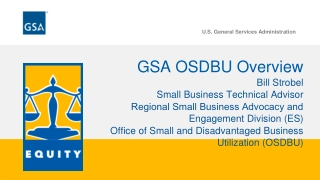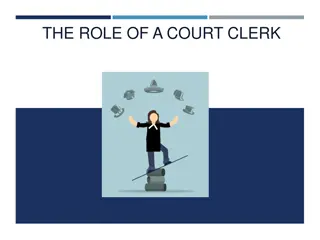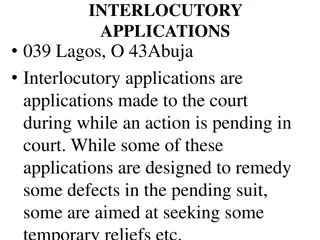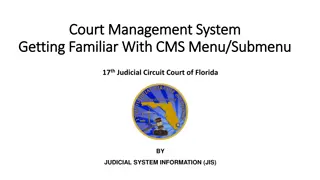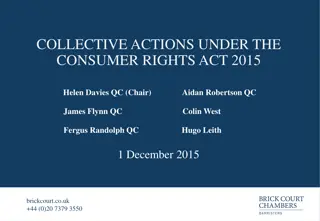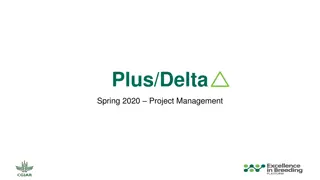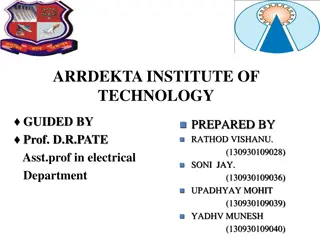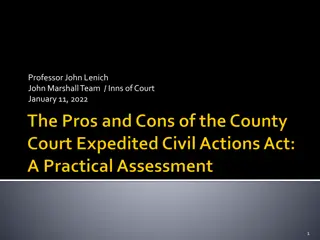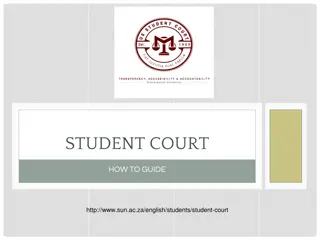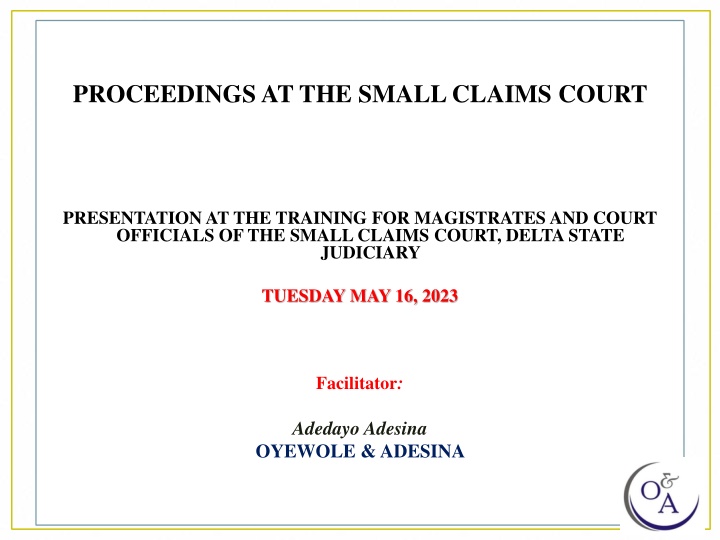
Small Claims Court Procedures for Magistrates and Court Officials
"Learn about the proceedings, defense strategies, counter-claims, and judgments at the Small Claims Court through this training presentation. Discover the importance of timeliness and compliance in resolving debt recovery disputes efficiently."
Download Presentation

Please find below an Image/Link to download the presentation.
The content on the website is provided AS IS for your information and personal use only. It may not be sold, licensed, or shared on other websites without obtaining consent from the author. If you encounter any issues during the download, it is possible that the publisher has removed the file from their server.
You are allowed to download the files provided on this website for personal or commercial use, subject to the condition that they are used lawfully. All files are the property of their respective owners.
The content on the website is provided AS IS for your information and personal use only. It may not be sold, licensed, or shared on other websites without obtaining consent from the author.
E N D
Presentation Transcript
PROCEEDINGS AT THE SMALL CLAIMS COURT PRESENTATION AT THE TRAINING FOR MAGISTRATES AND COURT OFFICIALS OF THE SMALL CLAIMS COURT, DELTA STATE JUDICIARY TUESDAY MAY 16, 2023 Facilitator: Adedayo Adesina OYEWOLE & ADESINA
Presentation Outline Introduction Defence/Admission Counter Claim Abandonment of excess Non-filing of Defence and Counter Claim Non-appearance Proceedings at Hearing Representation Evidence Judgment
Introduction The rationale for the establishment of the Small Claims Court is for the purpose of achieving an informal, inexpensive and speedy resolution of debt recovery disputes in the Magistrates Court See Article 1 of the Delta State Judiciary Practice Direction on Small Direction ). Claims, 2023 ( Practice As much as it is possible within the confines of the Practice Direction, the Magistrate must enforce strict compliance with timelines and trial dates.
Defence/Admission/Counter-Claim Article 6 Upon service of the Summons (Form SCC 3) on the Defendant, the Defendant defence/admission or Counter-claim within seven (7) days. shall file a The defence/admission to be filed by the Defendant shall be by completing Form SCC 5. Where a Defendant fails to file an Answer to the claim (in the form of a defence), such Defendant may be held to have admitted the claim.
Counter-Claim Article 7 A Counter-claim is a legal procedure which allows the Defendant to maintain an action against the Claimant in the same proceedings. It is thus a cross-action. A Defendant can claim against the Claimant a liquidated money demand not exceeding N5,000,000.00 (Five Million Naira) (excluding interest and costs) if such claim arises out of the same transaction or series of transactions without necessarily instituting a fresh action, by filing a Counter Claim form as in Form SCC 5 in answer to the claim.
If the Defendant intends to claim against the Claimant a liquidated money demand exceeding N5,000,000.00 (Five Million Naira) but not more than N10,000,000.00 (Ten Million Naira) (excluding interest and costs), (which is the limit of the general jurisdiction of the Magistrates Court), the Defendant may file a Counter-claim in the pending small claims action by filing Form SCC 5. The Counter Claim shall only be limited to the claims on record. The Claimant may file a reply to the defence and Counter Claim within 5 days of service of the Defendant s defence and Counter Claim. No pleadings would be allowed to be filed after reply.
Abandonment of Excess Article 7(2) & (3) If at the time the action is commenced, the Defendant intends to claim against the Claimant a liquidated money demand exceeding the general jurisdiction of the Magistrates Court, the Defendant may file the Counter Claim in the pending Small Claims action by filing Form SCC 5 PROVIDED that any judgment in the Defendant s favour shall be limited to the general jurisdiction of the Magistrates Court. In the event of the above, the Defendant/Counter Claimant shall be deemed to have abandoned the excess of the Counter Claim.
Non-filing of Defence and Counter-Claim Article 6 (1) & (3) The time frame for filing a defence or admission or Counter Claim is seven (7) days from the date of service of the summons on the Defendant(s). Where a Defendant fails to file an answer to the claim of the Claimant (in the form of an a defence, an admission or a Counter Claim), he would be deemed to have admitted the claim of the Claimant. The Claimant need not file an application for judgment in default of defence if the Defendant fails to file a defence to the summons within the prescribed seven (7) days from the date of service of the summons on him.
The court may however grant an extension of time to the Defendant to file his/her defence/Counter Claim to the summons, provided that the defence was filed before the summons is called for hearing but after seven (7) days of service of the summons on him/her. The touchstone of adjudication is the striving by the court to hear a case on the merits with a view to deciding the matter after hearing all the parties.
Non-Appearance Article 8 Where the claim is called for hearing on the date fixed and neither party appears, unless there is good reason to the contrary, the claim should be struck out by the Magistrate. Where the claim is called for hearing and the Claimant appears but the Defendant does not appear provided there is proof of service, the Magistrate may proceed with the hearing of the claim and enter judgment as far as the Claimant can prove his claim. A Defendant who has no real defence to the action should not be allowed to dribble and frustrate the Claimant and cheat him out of the judgment he is legitimately entitled to, by delay tactics aimed, not at offering any real defence to the action, but at gaining time within which he may postpone meeting his obligation.
Where the claim is called for hearing and the Defendant appears but the Claimant does not appear, the Defendant shall be entitled to an order striking out the claim, and if he has a Counter Claim, the court should proceed to hear the Counter Claim and enter Defendant/Counter Claimant can prove his Counter Claim. judgment as far as the A claim struck out on grounds of non appearance or want of diligent prosecution shall not be relisted but may be refiled upon payment of prescribed fees and incidental costs.
Proceedings at the Hearing Article 9 At the first appearance of the parties before the court, the Magistrate should promote, encourage and facilitate negotiation among the parties by referring them to the Delta State Multidoor Courthouse for mediation. The process of mediating and facilitating amicable settlement should not exceed seven (7) days. Parties to the suit are also encouraged to correspond with one another with a view to settling the matter amicably or to narrow the issues. If any settlement is reached by the parties outside the court during the pendency of the suit, the court shall be informed and the agreement of the parties shall be entered consent judgment accordingly.
In the event parties are unable to settle the dispute amicably, the court should hold a pre-trial conference for the purpose of giving directions for hearing of the claim or Counter Claim, including a hearing time table, length of trial or hearing, exchange of witness(es) list, formulation and settlement of issues as it appears to the Magistrate to secure the just, expeditious and speedy disposal of the claim or Counter Claim. The pre-trial conference shall be in the form of a case management hearing to narrow the issues in the case. Hearing shall be from day to day as far as is practicable and may be adjourned as a last resort and for the shortest possible time.
Adjournment should only be granted in unforeseen and exceptional circumstances such as ill health of either of the parties. A party may not be granted more than one (1) adjournment during the entire proceedings. The entire hearing period shall not be more than thirty (30) days from the first date of hearing inclusive of the seven (7) days period for facilitating an amicable settlement of the dispute. During the hearing the Magistrate may ask the witnesses any question or order the witness to produce any document in the witness possession in order to clear up any ambiguity to speed up the hearing. Stay of proceedings should not be granted by the court until final judgment is delivered.
Representation Article 10 Parties may represent themselves at the proceedings in the Small Claims Court. Partnerships and Registered Companies can be represented by either a partner, company secretary or any other principal officer of the partnership company.
Evidence Article 11 Parties may testify on their own behalf and tender all necessary documents and may call other witnesses to give evidence at hearing.
Judgment Article 12 Judgment in a claim shall be delivered within fourteen (14) days of the completion of hearing. The determination of issues raised in any interlocutory application(s) filed by any of the parties. judgment shall include the court s
Judgment Cont. The entire period of proceedings from filing till judgment shall not exceed sixty (60) days. Authenticated copies of the judgment shall be made available to the parties not later than seven (7) days from the date of delivery of the judgment. Judgment shall not be invalidated by reason of the entire proceedings of the court exceeding 60 days.
Conclusion Conducting and handling proceedings at the Small Claims Court should be geared towards making it progressively easier to resolve simple commercial disputes between parties and enforcing trade contracts in Nigeria with the ultimate effect of enhancing the ease of doing business. Time, speed and urgency are the pillars upon which the Small Claims Court is predicated. The Magistrate of the Small Claims Court must ensure the strict adherence to the timelines stipulated in the Practice Direction. The Small Claims Court has been proved to be the most effective cadre of the court in Lagos, Kano, Edo, Nassarawa, Rivers, and many other States.


